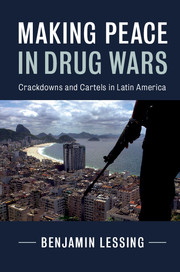Crossref Citations
This Book has been
cited by the following publications. This list is generated based on data provided by Crossref.
Daniele, Gianmarco
and
Dipoppa, Gemma
2018.
Doing Business Below the Line: Screening, Mafias and Public Funds.
SSRN Electronic Journal ,
Yashar, Deborah J.
2018.
Homicidal Ecologies.
Santos, Maria-Fátima
2019.
Prisons, State and Violence.
p.
99.
Tietjen, Grant
2019.
Convict Criminology: Learning from the Past, Confronting the Present, Expanding for the Future.
Critical Criminology,
Vol. 27,
Issue. 1,
p.
101.
Mejia, Daniel
Prem, Mounu
and
Vargas, Juan F.
2019.
The Rise and Persistence of Illegal Crops: Evidence from a Naive Policy Announcement.
SSRN Electronic Journal ,
2019.
Demanding Development.
p.
305.
Bada, Xóchitl
and
Feldmann, Andreas E.
2019.
New Migration Patterns in the Americas.
p.
57.
Idler, Annette
2020.
The Logic of Illicit Flows in Armed Conflict.
World Politics,
Vol. 72,
Issue. 3,
p.
335.
Trejo, Guillermo
and
Ley, Sandra
2020.
Votes, Drugs, and Violence.
Paoli, Letizia
2020.
What Makes Mafias Different?.
Crime and Justice,
Vol. 49,
Issue. ,
p.
141.
2020.
Authoritarian Police in Democracy.
p.
356.
Rodríguez-Gómez, Diana
and
Bermeo, Maria Jose
2020.
El nexo educativo con la guerra contra las drogas: una revisión sistemática.
Journal on Education in Emergencies,
Vol. 6,
Issue. 1,
p.
20.
Rodríguez-Gómez, Diana
and
Bermeo, Maria Jose
2020.
The Educational Nexus to the War on Drugs: A Systematic Review.
Journal on Education in Emergencies,
Vol. 6,
Issue. 1,
p.
18.
2020.
Front Matter.
Crime and Justice,
Vol. 49,
Issue. ,
p.
i.
Dias Felix, Annabelle
2020.
La police « démocratique » comme productrice de (dés)ordres sociaux : les cas du Brésil et du Mexique.
Lien social et Politiques,
p.
260.
Hassan, Mai
2020.
Regime Threats and State Solutions.
Pauschinger, Dennis
2020.
Working at the edge: Police, emotions and space in Rio de Janeiro.
Environment and Planning D: Society and Space,
Vol. 38,
Issue. 3,
p.
510.
2020.
How Insurgency Begins.
p.
278.
Esparza, Diego
Lucas, Jessica
Martinez, Enrique
Meernik, James
Molinero, Ignacio
and
Nevarez, Victoria
2020.
Movement of the people: Violence and internal displacement.
International Area Studies Review,
Vol. 23,
Issue. 3,
p.
233.
2020.
Property without Rights.
p.
392.



